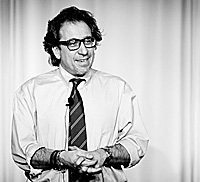By Emily K. Alhadeff, Assistant Editor, JTNews
Nigel Savage has been named one of the most influential 50 Jews in the United States by The Forward, he’s produced two independent British films (Solitaire for 2 and Stiff Upper Lips), and he’s the first English Jew, as far as he knows, to have biked across South Dakota on a recumbent bicycle. But that’s not what he came to Seattle last week to talk about.
As the third of four talks put on by the University of Washington’s Stroum Jewish Studies Program between professors and internationally known Jewish activists, Savage, the founder and executive director of the Jewish-environmental organization Hazon, spoke on Feb. 23 on the topic of “What’s Religion’s Place in Food Politics?” He was joined by Karen Litfin, a UW professor of political science.
“It’s kind of obvious. If I’m an English Jew, no wonder I would be interested in new approaches to food,” said Savage, drawing laughs from the multi-generational audience at the South Lake Union venue. He started Hazon in 2000, he said, because he loves Jewish tradition, but wanted “to renew it in a variety of ways.” The organization grew out of a cross-country educational bike ride; shortly thereafter, Hazon started the first Jewish community-supported agriculture farm-share program in America.
Savage explained the divide he tries to bridge with Hazon. On one side, you have kashrut, as well as “bagels and matzoh and chicken soup and chopped liver,” and on the other, “Michael Pollan, Supersize Me, Fast Food Nation, teenage obesity, genetically modified foods, the farm bill,” and a slew of political issues.
“The heart of what we’re trying to do is to lift the cellophane veil,” Savage said. The goal is “to enable all of us to think about our food and its sources, where it comes from, how animals are treated, how the land is treated, how people are treated, and where it goes to…. As Jewish tradition teaches, ultimately learning leads to doing and together we create a better world.”
Like Simon Greer and Ruth Messinger, the past two guest speakers brought in by the Jewish Studies Program, Savage locates his social and political ideologies in Jewish tradition. He even broke the audience down into groups for a brief Talmud study session.
The UW professors interviewing the speakers have not been Jewish, however, and have not drawn explicit connections between their work and spirituality. But what Savage and Litfin agreed on was the importance of a paradigm shift to food consciousness and sustainability — and that the health of the planet depends on this shift.
“The next 20 years are going to be utterly different than the last 20 years,” Litfin said. She remarked that in recent years, “Some of my smartest students suddenly were saying they wanted to be farmers. I graduated from high school in 1974. Nobody wanted to be a farmer if you had brains.”
Litfin teaches and writes about the environment, politics and international relations. Most recently she visited eco-villages on five continents, and she’s writing a book about the experience. Her surprise at her students’ inspiration to return to the land was abated when she realized, “All that was going on is they were paying attention to me in class.”
Litfin relates to the eco-religious movement from an economic standpoint. “The existing global human system in which we find ourselves is actually based upon a religion. A religion I would call “˜economism,’” she said. “What is sacred, what is valued, is what is economically valued. So everything in this religion is reducible to money.”
Litfin noted that religion can be an entry point for people to make change, but she’s not singularly optimistic about religion’s role in food politics.
“There’s this need to understand what it is to be human,” she said. “Religion asks us, “˜What are we giving?’ rather than, “˜What are we consuming; what do we get?’” At the same time, she added, secularists and atheists can also take part in “resacrilizing the world, understanding that there actually is something sacred that we’re part of.”
“We’re fully aware in this society right now of places where religion cannot be a force for good,” said Savage. “And yet I want to argue that in relation to the Jewish food movement that it’s a place where we can celebrate our tradition and make a difference in the world in really serious ways.”
Hazon’s cross-country bike ride starts in Seattle June 7. For more information visit www.hazon.org/programs/cross-usa-ride.
